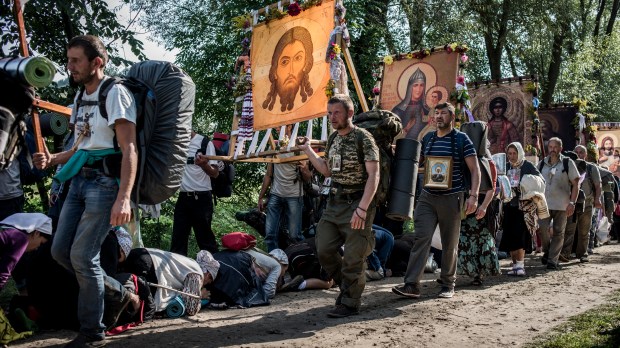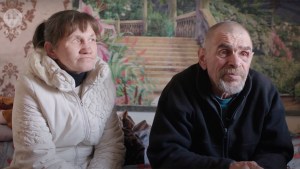Historian Antoine Arjakovsky, co-director of the “Politics and Religions” department at the Collège des Bernardins in Paris, taught for several years in Russia and Ukraine. An Orthodox Christian himself, he founded the Institute of Ecumenical Studies in Lviv, a predominantly Catholic city in western Ukraine. After the entry of Russian troops into the Donbass, and the invitation of the Pope to a day of fasting and prayer on March 2, 2022, he shared with I.MEDIA his hope that the Vatican will establish contacts with the Orthodox of Ukraine.
What is the influence of the churches, Orthodox and Catholic, in the current situation of Ukraine?
Arjakovsky: I talked about it during a recent presentation with Aid to the Church in Need: in Ukraine, the Churches are at the center of national identities and of the current conflict, but they are also indispensable for the search for peace. One cannot understand the conflict, nor conceive peace, without looking at the ecclesiological dimension of this rivalry between Russia and Ukraine.
Out of 40 million inhabitants in Ukraine, there are 6 million Catholics and 25 million Orthodox. Of the latter, 15 million belong to the Ukrainian Autocephalous Orthodox Church, which was canonically recognized by the Patriarchate of Constantinople in 2019, 5 to 7 million belong to the Ukrainian Orthodox Church, which has been attached to the Moscow Patriarchate since 1686, and the rest call themselves Orthodox without specifying their jurisdiction of affiliation.
Are the local churches united in defending the territorial integrity of Ukraine?
Arjakovsky: Faced with the risk of war, President Volodymyr Zelensky called a day of national unity on February 16, when all these Churches gathered to pray together in the Cathedral of Saint Sophia, a place charged with memories for Ukraine. The two main religious leaders of the country, H.B. Sviastoslav Schevchuk, major archbishop of the Greek-Catholic Church, and Metropolitan Epiphanius, head of the Orthodox Church of Ukraine, called on the population to remain calm, while being aware that the slightest exchange of fire could make everything go wrong.
That day, the head of the Greek Catholic Church urged the faithful to remain calm, saying: “Do not be afraid. We suffered a lot during the Soviet era, but God is with us. We must not lose confidence, we must remain calm and not panic.” This is something that has resonated strongly with the population, as did the day of prayer proposed by Pope Francis on January 26.
What is the image of Pope Francis among the Ukrainian population, especially among the Orthodox?
Arjakovsky: Ukrainians have very strong memories of the visit of John Paul II in 2001, and they dream of seeing Pope Francis come to their country, but this does not seem to be on the agenda. At present, the Vatican is pursuing an Ostpolitik that is essentially oriented towards the Moscow Patriarchate, as demonstrated by the recent meeting in Paris between Cardinal Kurt Koch, president of the Pontifical Council for Christian Unity, and Metropolitan Hilarion, head of the Moscow Patriarchate’s external relations department.
My Catholic friends are right to conduct a respectful dialogue with the Moscow Patriarchate: this Church has had many martyrs, and it too suffered greatly from Soviet repression, with 95% of its bishops sent to the Gulag. But I would like the Holy See to also make contact with the Orthodox Church of Ukraine, which is recognized by the Patriarchate of Constantinople as the 15th Autocephalous Church, which has caused a schism with Moscow since 2019.
For the moment, Rome has not established direct channels with this Church?
Arjakovsky: Indeed, three years after his election, Metropolitan Epiphanius has not yet had any official contact with the Holy See, which I find a little too timid, while he could contribute to peace by assuming a mediation between the patriarchates of Moscow and Constantinople.
I insist on the fact that the day of prayer proposed by Pope Francis on January 26 was important, but the Ukrainian people are now waiting for concrete gestures. Prayer allows for dialogue, for a certain trust. It’s not a question of throwing stones at Vatican diplomacy, which is the fruit of a long history, but it would be necessary not to direct efforts only towards Russia.
Beyond this position of the Holy See, which you consider too cautious, are you worried about a form of “Russophilia” in a large part of the Catholic world, especially in France, and about a blindness towards Vladimir Putin?
Arjakovsky: I myself am of Russian origin, and I am of course very touched by the interest of many French people in the “Russian soul,” in Russian culture and spirituality. But one must open one’s eyes to the reality, to the reality of current Russian power. Vladimir Putin is nostalgic for the Soviet Union; he has openly declared that he considers the dissolution of the USSR to have been a “catastrophe.”
Today we are witnessing a conflict of civilization between those who think that we can be proud of the Soviet Union, and those who believe that communism was terrible. We must not forget that in the 20th century, communism caused 100 million deaths, that is to say 100 million murdered people, as Nicolas Werth reminded us in The Black Book of Communism. We cannot leave such a dramatic period unjudged. But since the end of the USSR in 1991, communism has not really been judged.
Moreover, President Putin has not respected the international commitments of his country. The “Budapest Memorandum” signed in 1994 between the United States and Russia organized, among other things, the denuclearization of Ukraine in exchange for a guarantee of inviolability of the country’s borders. Russia reneged on its signature 20 years later by annexing Crimea.
So Western Christians must avoid a fascination that would prevent them from being lucid in the face of Moscow?
Arjakovsky: In 2018, I created a commission for dialogue, justice, truth and reconciliation with the help of the European Union, involving more than 200 Russian, Ukrainian and other European intellectuals. We worked in particular with International Memorial, recently banned by the Russian authorities. Westerners must open their eyes and face reality.
Today there is incompatibility between those who want to defend communism and those who want to defend the social doctrine of the Church, that is, on a civil level, the dignity of the person, freedom, democracy and human rights. President Putin considers that liberalism is a form of decadence, and that regimes based on “verticality of power” are needed, whereas the Ukrainians want to follow the European model.


